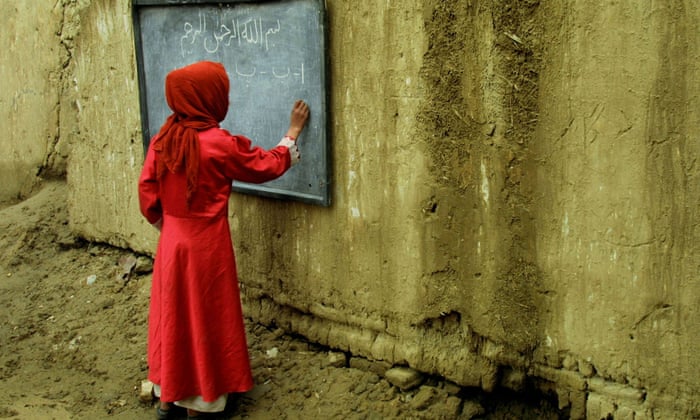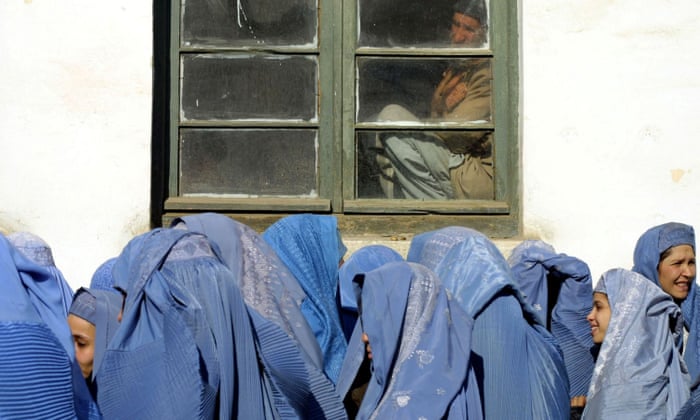Taliban Committee for the Promotion of Virtue and the Prevention of Vice
"We don't want a peace that will make the situation worse for women's rights."
"Come that time [should the Taliban be given a share of government power in Afghanistan], they will complete their incomplete dreams and they will be crueler than in the past."
Robina Hamdard, head, legal department, Afghan Women's Network
"We don't want to be the victims of the peace process with the Taliban."
"But the Afghan government totally ignores Afghan women on the peace process."
Laila Haidari, Afghan businesswoman
"[I well remember during the years of Taliban rule being] forced to be inside a dark cage when out of our houses -- I mean the burqa."
"I have been an M.P. twice and a university professor, but no one has ever asked me about peace talks with the Taliban."
"We have had 40 years of war and everybody is tired of fighting, but that peace should not be at the price of losing our rights and freedom as women."
"We want the Taliban to accept women's rights and publish a statement where they guarantee women's rights."
Shukria Paykan, Kundiz, Afghanistan
"Acute misogyny in Afghanistan goes way beyond the Taliban. Without a strong U.S. hand there, it is not looking very good for Afghan women."
"They [Afghan government and the Taliban] can do as they like to them [women] after we leave."
Ryan Crocker, former U.S. ambassador to Afghanistan
"When we heard that U.S. troops will leave Afghanistan in 18 months, we girls were asking each other, 'Now what will become of us'?"
"People already think we are bad girls for dancing. What will happen to us if the Taliban become part of the government?"
Qadria Azarnoosh, Hazara traditional dancer
 |
| In March 2002 in Kabul, an Afghan girl learns the Dari alphabet during a lesson in an outdoor classroom. Girls who the Taliban banned from education were attending classes for the first time in six years. Photograph: Natalie Behring-Chisholm/Getty Images |
Women in Afghanistan who were freed from the Taliban insistence that they appear in public only in the presence of a male guardian and only totally enveloped in a black burqa, to be enabled to become students once again from primary grades to university, will obviously revert back to the time when music was disallowed, girls and women were not permitted to attend school, to work or to celebrate weddings should the Taliban return to power.
Without the civilizing presence of the U.S.-led NATO countries' presence as NGOs, military, civilian monitors and foreign civil infrastructure guides the advantages that women in Afghanistan were able to access finally would never have occurred under the Afghan government.
The Taliban are merely the most fundamentalist of the Islamist clerics and males in Afghanistan, most other Muslim males are only moderate by comparison; conventionally, traditionally, women have had no place in the public sphere, in the workforce, within the educational system. Women requiring medical help had to attend to female-only hospitals where all staff were women, and even they were required under the Taliban to be fully geared in Burqas within the hospital environs, even surgeons performing surgery. This is what awaits women in Afghanistan.
The United States fully realizes that the only way they will be able to pull their troops out of Afghanistan is to convince both the government and the Taliban -- all most of the Pashtun majority tribe -- to make peace by sharing governance. This would be a face-saving device for the Americans while at the same time performing a similar function for the Islamist adversaries. The position of Afghan women is purely co-incidental to the process. This is, after all, with or without the ideological fundamentalism of the Taliban, an Islamist society.
Within Islam it is entirely permissible to appear to be agreeing with an adversary until such time as opportunity presents to pursue the original agenda. The Taliban has been unwilling to meet with the Afghan government despite the government's willingness, even eagerness to reach an agreement with their ideologically pure counterparts. A peace agreement would simply be the initial step in 17 years of conflict for the Taliban to resume their former control of the country. And the fate of the women of Afghanistan will once again be dismal beyond belief.
For a woman as liberated as Shukria Paykan, parliamentary member, and one-time university professor, the concern is that her daughter's school will once again be forced to close. "Women need to raise their voices so they are not forgotten", Habiba Sarabi, deputy of the High Peace Council in Kabul, one of 14 women on the 75-member council stated. All previous efforts at peace talks had excluded women. "We came a long way to achieve the rights we have now", said Saira Sharif, a politician from Khost. "Just to lose them after a peace deal."
As for the Taliban, they do have a stated position on women's rights in Afghanistan. Their spokesmen have pointed out that the Taliban is more than willing to assure Afghan women that their rights will be fully respected. Those rights the Taliban speak of, they emphasize, represent all the rights that Islamic script guarantees them. Those are the rights the Taliban recognize and are fully committed to, just as they were in the days of their rule when al-Qaeda and Osama bin Laden were honoured in Afghanistan as one among them in the faith.
 |
| In February 2002, a man looks at Afghan women waiting to apply for jobs at Kabul’s Ministry of Women, which initiated a drive to encourage professional women to re-enter the workforce after the demise of the Taliban. Photograph: Natalie Behring/Getty Images |
Labels: Afghan Women, Afghanistan, Human Relations, Peace, Taliban, United States

<< Home